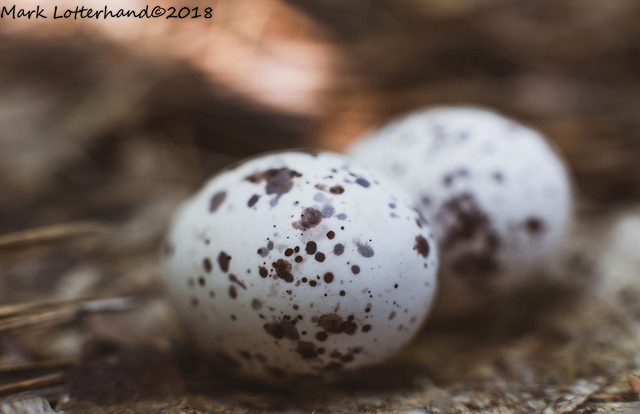The Whip-poor-will prefers forest habitat adjacent to large clearings (photo: Sue Barth, ChirpsandCheeps.com).
“Eastern Whip-poor-will populations have declined 60% over the past 45 years.”
Last summer about this time of year my family and I were camped in a far corner of a local campground, up against a recently harvested woodlot. It was peaceful and quiet, we loved the seclusion. One evening, my husband (who happens to be an ornithologist) and I were sitting around the campfire when we heard the distinctive song of a Whip-poor-will coming from the logged area. We were thrilled! We only heard the bird sing briefly, but it was music to our ears. This insect-eating bird of young forest habitats is well known for its distinctive three-note call.
Audubon's Field Guide describes the call as "a loud rhythmic whip-poor-will, repeated over and over, at night." It's quite haunting and magical, and was a common night sound on the historic landscape. It was so common in fact, that I've had countless "old timers" ask me: "Where have all the Whip-poor-wills gone?" You see, it's become rare to hear a Whip-poor-will, and that's why we were so excited to hear one around the campfire.
Eastern Whip-poor-will populations have declined 60% over the past 45 years (and they are not alone).
Why Have Their Numbers Dwindled So Much?
There are two leading causes. First, Whip-poor-wills are insectivores (insects are their primary food), and most of our insectivorous birds are in decline due to lack of food. Our widespread use of pesticides has resulted in an overall decline of insects, thereby affecting insectivorous birds (among other insectivores like bats). Secondly, their habitat has been in rapid decline. They prefer open, young hardwood forests, which are now uncommon in this part of the world. Forest maturation and increasing development are major factors. Contrary to popular perception, timber harvesting can greatly benefit many species of wildlife, including our Whip-poor-will. In my case, the recent logging next to the campground had attracted this summer breeder. If you are a forestland owner, you too can attract many species of young forest-dependent wildlife through forestry practices that mimic natural disturbances. On behalf of the Whip-poor-will, American Woodcock, Chestnut-sided Warbler, and many others, I enjoy working closely with the eco-minded landowner to plan responsible, sustainable timber harvests that enhance forests for wildlife.
Whip-poor-wills do not build a nest, but lay eggs on the open ground (photo: Mark Lotterhand on Flickr).
Did you know? Whip-poor-wills that breed in Maine overwinter in Honduras, so be sure to drink bird-friendly coffee if you want to help conserve these birds and ensure that more come back to breed here each year.
SIGN UP TO RECEIVE FREE HABITAT TIPS, TOOLS, AND TRICKS AND ADVANCE NOTICE OF DEB’S SIGNATURE EVENTS.
#ThePersonalEcologist
I co-create biodiverse habitats with eco-minded stewards throughout the Northeast - at any scale.
I have 30 years of experience and a lifelong commitment to wildlife conservation.
Read My Story.
-
Deborah
Perkins
- Dec 22, 2023 Storm Habitat: Nurse Logs, Dens, and More
- Aug 8, 2023 Beautiful Buttonbush in Bloom
- Jun 17, 2023 Snapping Turtles on the Move
- Feb 1, 2023 The True Harbingers of Spring: Chickadees
- Mar 20, 2021 The Power of Photoperiod
- Feb 19, 2021 The Golden-crowned Kinglet: A Royally Charming Winter Resident
- Feb 8, 2021 Subnivean Secrets
- Jan 9, 2021 Wild Reads: Ravens in Winter
- Oct 23, 2020 Flower “Beds” for Bumble Bees
- Oct 4, 2020 Wise Oaks, Clever Jays
- Sep 11, 2020 Goldenrods: Top Plants for Boosting Biodiversity
- Aug 25, 2020 Gentle Golden Wasps Adorned with Pollen
- Aug 1, 2020 Water for Wildlife - Birdbath Basics & More
- Jul 19, 2020 Fruits of the Forest
- Jul 11, 2020 Hungry Little Hummingbirds
- Jun 24, 2020 Hatching Out: Mother Nature's "Escape Room"
- Jun 12, 2020 Maine's Real Lupine Revealed
- May 31, 2020 Wild Geranium in Flower
- May 24, 2020 Moosewood Chandeliers
- May 17, 2020 Shadbush in Bloom
- May 7, 2020 Native Nectar for Queen Bumble Bees
- Apr 25, 2020 Waves of Warblers
- Apr 19, 2020 Attracting Bluebirds without Boxes
- Apr 12, 2020 Hungry Bears on the Move
- Apr 5, 2020 Bees on Red Maple Flowers
- Mar 27, 2020 Sky Dancing
- Mar 22, 2020 Fox Kits Being Born
- Mar 15, 2020 Corvids a-Courtin’
- Mar 8, 2020 Phenology Notes: Witnessing The Seasons of our Wild World
- Feb 5, 2019 Plan Your Habitat Garden
- Jan 2, 2019 Wild Reads: We Took to The Woods
- Nov 28, 2018 Winterberry: The Gift that Keeps on Giving
- Aug 16, 2018 Where Have All the Whip-poor-wills Gone?
- Jun 22, 2018 Give a Warm Welcome to Wild Bees (Super-pollinators Part 2)
- May 16, 2018 The Wonder of Wild Bees (Super-pollinators Part 1)
- Apr 19, 2018 Saving Songbirds Starts with Your Morning Coffee
- Mar 21, 2018 Wildlife Habitat Design in A Wounded World
- Feb 16, 2018 “Intelligent Tinkering” - How to Boost Biodiversity at Home (Leopold’s Wise Words Part 2)
- Jan 18, 2018 Carnivore Coexistence (Leopold's Wise Words - Part 1)
- Dec 14, 2017 Dead and Dying Trees are Key to Life
- Nov 14, 2017 A Top Threat to Biodiversity: Invasive Plants
- Oct 18, 2017 Hallowed Habitat
- Sep 21, 2017 Beechnuts - Superfood for Bears & Other Wildlife
- Aug 22, 2017 Baby Bats Need Love Too
- Jul 25, 2017 Bring the Magic of Fireflies Back Home Again




